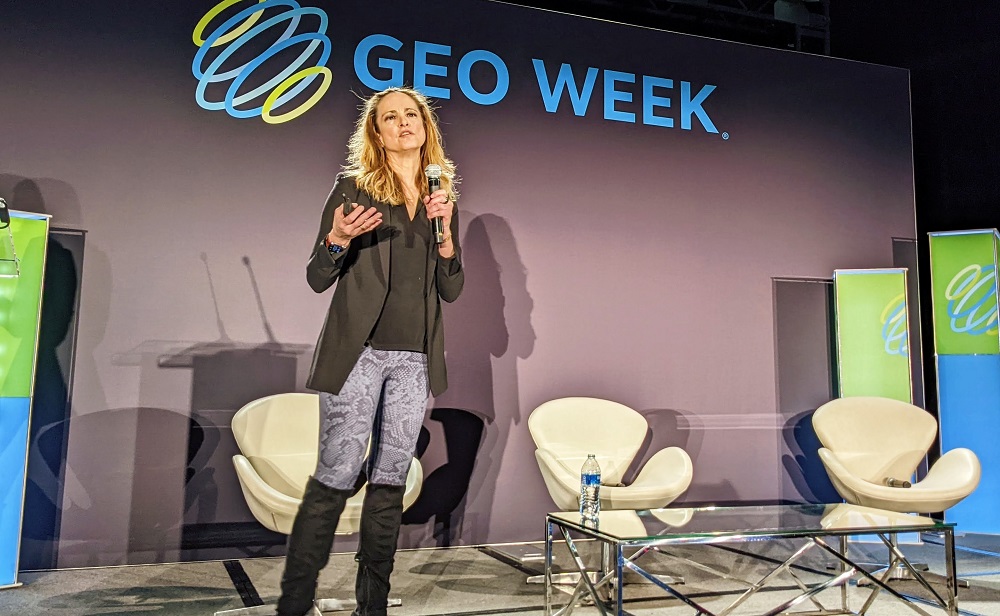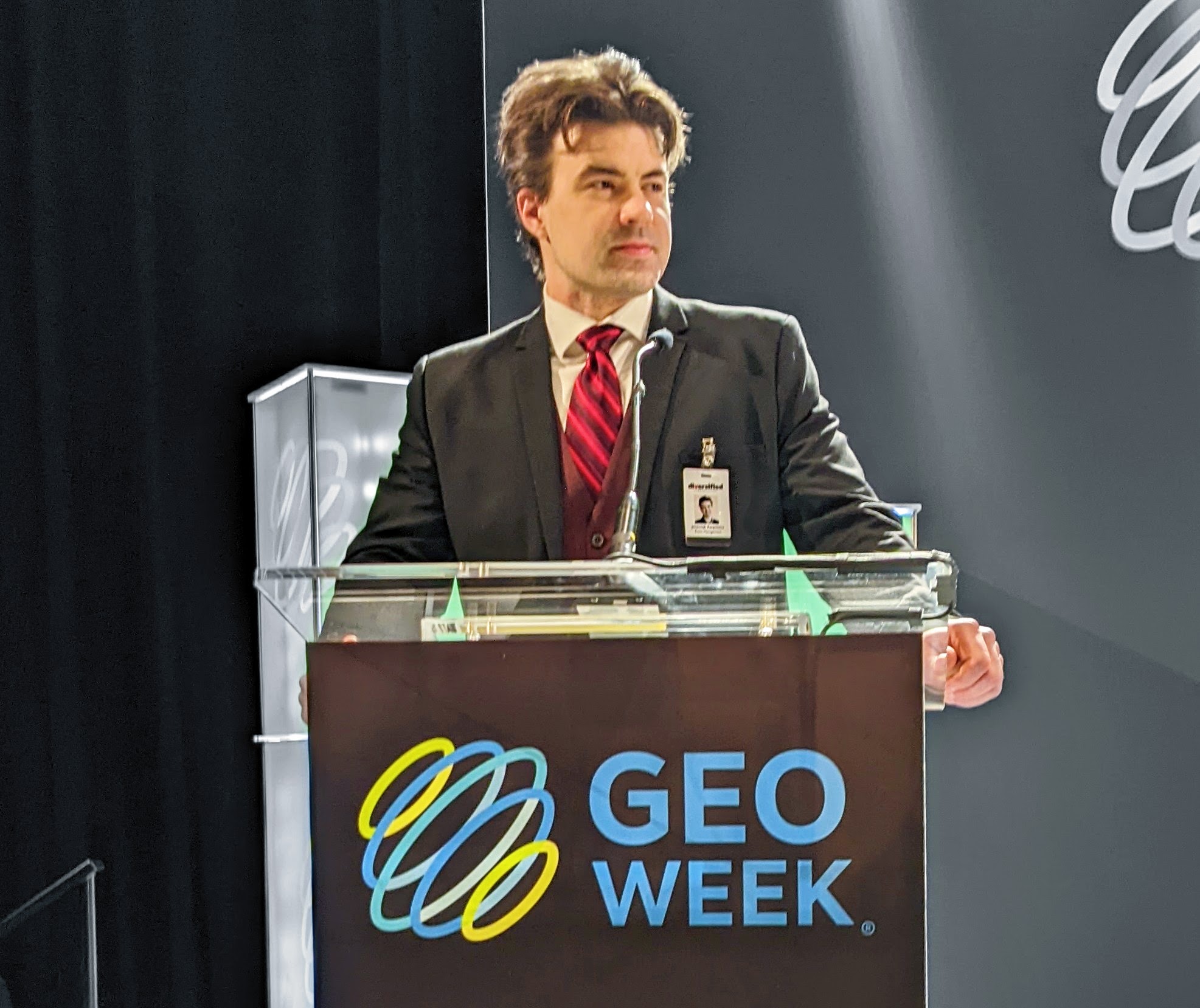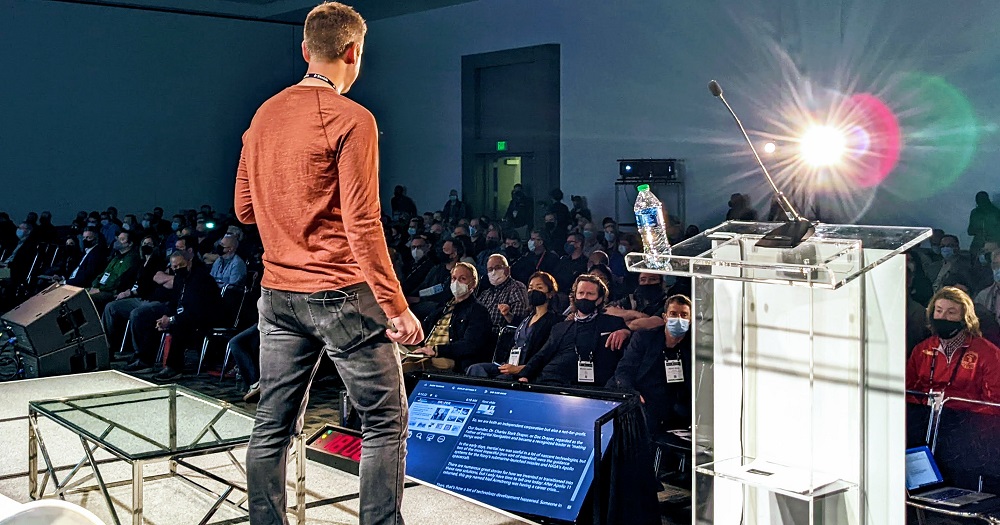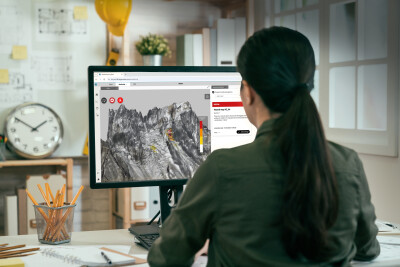To say that the keynotes which kicked off Geo Week were a long time coming is an understatement if there ever was one. The COVID-19 related delays for the event in 2020 and 2021 contributed to this buildup but Geo Week 2022 represented the coming together of technologies and communities that extends back nearly a decade.
As we detailed in the run-up to the event, the Geo Week umbrella represents the evolution of SPAR 3D along with AEC Next and the International Lidar Mapping Forum (ILMF). This single event is a response to the changing needs in built world and geospatial industry that are redefining expectations across teams, organizations and entire industries. That’s part of the reason the “the intersection of geospatial and the built world” tagline is so instructive, because Geo Week represents a true intersection of tools, technologies and people at the highest levels.
As Program Manager, Space Systems Program Office at Draper, Alan Campbell might not seem like the most obvious person to kickoff an event that is focused on this intersection of the built world and geospatial industry but that very concept is something he addressed and explored. As he explained before the event, his goal with his keynote was to help the audience understand what it means to break down the walls between industries and looking for tech in unlikely places can bring us closer to solving complex technical challenges. He did so by detailing the interesting and connected problems that are related to everything from lunar landing logistics when it comes to relative altimetry, relative velocity, and landing site mapping to the vertical integration challenges that Draper needs to address and sort through. They’ve been doing both for decades.

Founded in 1932 as the MIT Instrumentation Laboratory, the organization is best known for developing the Apollo Guidance Computer that enabled astronauts to land on the Moon. Today, the non-profit research and development organization is working through what it means to solve challenges related to autonomous mission management that will be accurate enough to enable vessels to dock while moving thousands of miles per hour through deep space.
Those technical challenges are in addition to larger ones like how humans are actually going to live on the moon. Mining and extraction, power production and storage, human-machine teaming and crew survival are just some of the questions that his team is asking and working to answer. Doing so requires the types of connections and collaborations that Geo Week was designed to enable, and Campbell mentioned that’s why the time is right for outside the box solutions. He’s seen how much innovation is happening commercially and how solutions showcased at the event are building a space economy that he encouraged everyone to cultivate and engage with.
“We have solutions, but the more interesting ways we can think about these problems are always welcome,” Campbell told the audience. “We working on these problems in a way that isn’t just about how they’ll need to work in space. That’s why we want to make connections anywhere and everywhere we can.”
Exactly what those connections can look like is something the next keynote speaker detailed, as Amy Peck, Founder & CEO of EndeavorXR, is especially focused on enabling them across teams and organizations in whole new ways. She used her time on stage to further explore the future of digital collaboration that is taking place now and is further evolving before our eyes.

COVID-19 has forever changed the way that many teams work with one another and Peck explained why this change wasn’t just necessary, but inevitable. Knowingly or not, many teams and organizations were already in the midst of a digital transformation but the pandemic accelerated it. However, the video calls we’ve now become accustomed to is not the future of work. They were created in a reactive mode but true innovation cannot take place in a reactive manner. Proactive VR solutions around what it means to collaborate in more effective ways are both available and transformative.
“What do we want our products and services to look like?” Peck asked the audience. “What does the workforce look like in 10-20 year? Zoom isn’t the answer but immersive technology solutions that blend the physical and digital absolutely can be, but they’re just the beginning.”
Peck talked through how the augmented reality (AR), virtual reality (VR) and mixed reality (MR) ecosystems that she helps stakeholders enable and understand at EndeavorXR are ultimately designed to blend these immersive solutions with blockchain, robotics, AI and more. There’s a lot of talk about how such ecosystems are going to work in the metaverse, but Peck mentioned the metaverse is just "the internet in 3D". She detailed how solutions like AR Cloud will allow the world to literally be painted with data. All of it will need to be anchored by all types of data, including geospatial data.
In these new ecosystems, collaboration will be a key element in all business activities. VR allows people to go behind the computer screen to do things like review 3D assets in real time, eliminating costly and timely approval processes. It’s an example of how collaboration can be approached in a whole new manner.
That’s especially important in the AEC industry, which is finally undergoing the massive transformation many have been pushing for since the infamous McKinsey report was published, which said that large projects typically take 20 percent longer to finish than scheduled and are up to 80 percent over budget. Many have understood that new tools and technologies are the key to eliminating the inefficiencies in construction but the process to actually adopt these solutions has been slow. The pandemic forced this adoption by displacing archaic systems that some would have otherwise kept in place but that is still a reactive process which hasn’t created maximum value. There needs to be an understanding of current workflows and work forces.
That lesson is what Peck tried to focus the audience on in terms of experimenting with these systems and defining how individuals and teams can best use them. If those individuals and teams can find the ROI the economy of scale can be opened up across an organization. There are numerous XR use cases in building landscape management that show exactly what this can mean, as such solutions are used for real time diagnostics, billing purposes, remote technical assistance, and safety training.
That scale and ROI is where the value of such solutions can be realized but both Geo Week keynotes highlighted that realizing this value isn’t ultimately about a single solution like VR or a project that will eventually land the next person on the Moon. This value is defined by an intersection that is about much more than a single person, or a single innovation, or a single industry. Geo Week is designed to pull them all together, but as Peck mentioned, it’s just the beginning on every level.
And since that beginning for Geo Week was such a long time in the making on several levels, I couldn’t resist the urge to document it in the only way that matters. Here's hoping it becomes a tradition for the event that similarly evolves.






